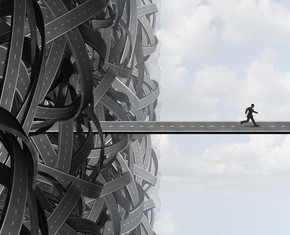The views expressed in our content reflect individual perspectives and do not represent the authoritative views of the Baha'i Faith.
“Lucianna, it’s time for bed.” “No, Mommy, no. I want you to read me that new book Uncle Unam got me today.”
“‘The Billiard Ball People,’” yes, he bought you that. I wasn’t sure it was right for a three-year-old. I wondered if hearing about those old-time people back in the 2000s would upset you, but he said it’s good for you to know about the old days so you can be grateful you live now.”
“Can it be my bedtime story tonight?”
“Do you feel awake enough to focus on a book that isn’t a happy story?”
“I think so, Mommy. I am really curious about it. I’ll tell you if I get too tired.”
RELATED: Honest Spiritual Storytelling
“Yes, well, OK. Sit here on the side of the bed with me, and we will take a look at it. This is a book about a time way before now when people didn’t know how they were connected to each other.
“Here, let’s open the book. See all the billiard balls on the table? In these times, how we live now, we know how to connect our minds together, so our feelings in our bodies and the way we look at each other and all those things we take for granted make our one mind possible. But back in those olden days, people didn’t even know they were one. They thought they were like these billiard balls. See, all the different colors, rolling around, bumping into one another, and here these sticks so you can hit the balls.”
“We have one of those tables in the Play-Time building, Mommy, but I’m too short to play. Even with a stool.”
“Yes, people still play that game. I think Uncle Unam likes it. People back then played that game for fun too, but this book compares the way they thought about themselves and about each other to the game of billiards.”
“What do you mean, Mommy?”
“It’s called a metaphor. When you compare one thing to another to make a point. You know how our Baha’i prayers say we are the “leaves of one tree?”
“Yes. I know that prayer!: ‘… to behold them all as birds in one garden of roses, as pearls of one ocean, as leaves of one tree, as rays of one sun.’”
“You do know that prayer! Well, you know you aren’t a tree, right? That leaves and tree thing is to give you a picture in your mind of our oneness with all the people on Earth.”
“I know we’re not trees, Mommy! I know that means we’re all connected up together.”
“Yes, honey, we know this now, but back then, people didn’t understand it. Instead, people back then thought they were separate. They called themselves “individuals.” See here on page 2, just one ball on that page. All alone. They even thought that was a good thing.”
“What gave them that idea?”
“People back then didn’t pay attention to their bodies, which told them they felt better being together, being peaceful, and sharing. They were like the people who came even farther back before them who were always fighting each other — you know, like those kings and castles books we’ve read. People in the way-back who rode around on horses with spears and shields and all that. These people still had that war-like idea instead of the oneness idea we have now.”
“Oh. Sad.”
“Yes. Now, turn the page, and there are the smiling balls rolling around alone, occasionally bumping into each other. The idea was to imagine yourself as the only ball on the table. They called it being ‘self-sufficient.’”
“What does that mean?”
“Self-sufficient meant what they called ‘standing on your own two feet,’ not needing others. And then, to make matters worse, here on this next page, you see this one ball believes it is better than the other balls — and that’s where the sticks got into it. A big ball would gather up one group of balls to bang into another group with sticks.”
“Oh, no!”
“Turn the page. You can see what a mess that was! I’m not sure you’re ready to even think about that kind of thing.”
“Yeah, I don’t like that page, Mommy. That doesn’t sound like much fun, even though I like to hear them play the real game in the Play-Time Building. I like the sound the balls make when they click together.”
“Yes, that’s a nice sound, that click, click. But in those old days, the sound wasn’t nice. Because they thought they were separate, and each ball was afraid to share because — well, the whole thing was a mess because they really weren’t separate at all. They just thought they were. And then they got afraid of each other — and mean, too, sometimes. Fear can do that. Make it hard to feel love and all.”
“Like that time last year when that puppy nipped at my ankles, and then for a long time, I was afraid of dogs?”
“Yes, just like that. All that fighting for century after century had given them such fear of each other. They didn’t know each other at all. They would talk and not even look at each other and not share feelings, and well — they were an ignorant people.”
“Why, Mommy? Why didn’t they learn oneness from their mommies and daddies?”
“The mommies and daddies thought they were billiard balls too. They thought it was scientific — you know — because in their primitive minds, the fact we don’t share a physical body made them think everything about us was separate. They only wanted to talk about what you can see with your eyes, out your eyes when they are open and it’s daylight. They wanted to be able to measure things.”
“Like with a ruler?”
“Yes, or fancy machinery. They really liked machines. In fact, they even thought they were machines. They were always talking about brains being like computers.”
“Brains, Mommy? You mean that part of our body?”
“Uh, yes, dear. I’m sorry, I drifted. I’ve been reading a lot lately about those old days. It’s funny Uncle Unam brought you this book. Anyway, here on page 6, you see the sticks again. They got bigger and bigger sticks, and they would hit the balls around the table harder and harder as the problems got bigger and bigger.”
“What a funny book! How could hitting solve anything?”
“Exactly. It didn’t, honey, and that is the point of the story. You see here on the next page where they start to realize that trying to win at billiards is making them all unhappy. They start to learn how to put their heads together and see both from their own point of view and also from the other person’s. They start to soften up.”
“Like tomatoes, Mommy?”
“Tomatoes? Well, that’s a good one. I guess so; they soften like tomatoes so they can get squished together in their minds. I like that!”
“Did they grow tomatoes then too?”
“Maybe, but probably each in their ‘own’ garden and their ‘own’ houses. That’s the funniest part. Instead of all living together like we do — sharing this lovely community and all these friends — they liked living alone in little boxy houses. Or maybe just with a few people they were related to by blood — like you and me.”
“But not like Uncle Unam?”
RELATED: The Power of Family Story Time – and Its Long-Term Effects
“No, he’s our friend, but we don’t pay any attention to that, do we? We see now that we are all fruits of one tree. Remember what Abdu’l-Baha said?
A fundamental teaching of Baha’u’llah is the oneness of the world of humanity. Addressing mankind, He says, “Ye are all leaves of one tree and the fruits of one branch.” By this it is meant that the world of humanity is like a tree, the nations or peoples are the different limbs or branches of that tree, and the individual human creatures are as the fruits and blossoms thereof. In this way Baha’u’llah expressed the oneness of humankind …
“I remember Uncle Unam read that at the Baha’i Feast last week.”
“Good memory, Lucianna! And why did you ask about tomatoes anyway?”
“Because we got our first one in the big garden patch today.”
“Ah, you are tired. Your mind is wandering around.”
“Can we read the billiard ball book some more tomorrow, Mommy? I think those people back then are funny, except for the part where they hit each other with sticks.”
“Sure, honey. We will look at it again tomorrow, and you can thank Uncle Unam for it and tell him what you learned.”
“I learned, I’m sure, glad I’m not a billiard ball!”
“Me too, honey, me too. Good night.”
















Comments
Sign in or create an account
Continue with Googleor